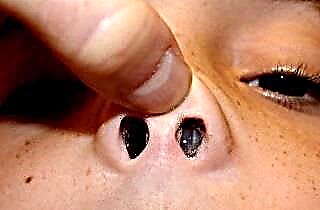A sore throat is not the only sign of pharyngitis. In some cases, sore throat is not so pronounced, so coughing comes to the fore. Rapid treatment can prevent the spread of inflammation to the lower respiratory tract and the development of bronchitis. How to treat a cough with pharyngitis?
 First, let's look at why a cough appears and how it develops. It is a reflex forced exhalation, which is accompanied by sonority. A cough provocateur can be the accumulation of sputum, inhalation of strong odors, cold air, or a foreign element entering the larynx.
First, let's look at why a cough appears and how it develops. It is a reflex forced exhalation, which is accompanied by sonority. A cough provocateur can be the accumulation of sputum, inhalation of strong odors, cold air, or a foreign element entering the larynx.
The cough thrust allows you to clear the airways by vibrating the walls of the organs and passing air at high speed. Cough appears due to irritation of receptors on the surface of the mucous membrane of the respiratory organs. After exposure to the provoking factor, a deep breath is taken, the glottis closes, and high intrathoracic pressure is created. After a sharp opening of the gap, an air stream is formed at the speed of a hurricane, with which sputum, microbes and foreign elements are removed.
What happens with pharyngitis? The resulting inflammation stimulates cough receptors due to tissue edema and mucus production with active substances. The accumulation of secretions from the cells of the respiratory organs, mucus and pus leads to irritation and the appearance of a cough.
Features of cough
The first sign of inflammation of the respiratory system is coughing. It can appear suddenly in the form of an attack or single coughing shocks. If the infection is aggressive, intoxication, inflammation in the oropharynx and larynx increases for several hours, after which the cough becomes more frequent and stronger.
The cough can also persist for several days without turning into a cough if the person is started on treatment right away. In this case, it is possible that pharyngitis will end with this.
Often we do not pay attention to the first signs of the disease, so the cough gradually becomes painful and paroxysmal. Due to the small amount of accumulated sputum, she does not cough up her throat.
Cough worries at night, closer to the morning, when the volume of mucus gradually increases, increasing irritation of the receptors. As a result of the appearance of a strong nocturnal cough, a person does not get enough sleep, he feels "overwhelmed" and walks drowsy and irritable all day.
Due to a dry cough, a sore throat may increase, because the cough further injures the inflamed mucous membrane of the oropharynx. As the volume of secretion increases, the cough may become moist.
Chest pain may be caused by a buildup of viscous phlegm in the airways.
At the moment when the phlegm begins to cough up, the temperature decreases and the soreness in the chest decreases. Pharyngitis and cough can develop due to:
- infection of the body with viral, bacterial or fungal pathogens;
- general hypothermia;
- inhalation of cold, polluted air;
- exposure to allergens;
- smoking.
Treatment tactics
 Preparations for cough pharyngitis should be taken, not forgetting to follow the general regimen. This will alleviate the condition and speed up recovery:
Preparations for cough pharyngitis should be taken, not forgetting to follow the general regimen. This will alleviate the condition and speed up recovery:
- limiting loads. Most of the day should be spent in bed in order to restore the internal forces of the body to resist the disease. In addition, a person warms up under a blanket and does not fall under the influence of a draft;
- Drink at least 2 liters of fluid daily. The choice of drinks depends on the preferences of each person. The main requirement is a warm drink. It can be teas with raspberries, mint, currants, honey, compotes, fruit drinks, herbal teas and milk. Alkaline drinking is especially useful, for example, you can add 1 g of soda to milk or drink non-carbonated mineral water. A sufficient drinking regime makes it possible to accelerate the elimination of toxins from the body, which will reduce inflammation, fever, and also dissolve thick phlegm, preventing it from accumulating in the respiratory tract;
- the air in the room should be humid and fresh, therefore it is recommended to ventilate the room 2-3 times a day, as well as to use a special humidifier. Also, do not forget about cleaning;
- communication with sick people, for example, with ARVI, can lead to additional infection, which will significantly worsen the course of pharyngitis. If contact is urgently needed, a disposable mask should be used;
- problems should not be taken to heart;
- fresh vegetables, herbs, fruits, dairy products, fish and chicken are allowed from food products. During the period of treatment, it is necessary to limit the intake of spicy, fried, salty, fatty foods, canned foods, trans fats, muffins and sweets;
- sufficient sleep and rest is required, as the body needs strength to recover;
- to give up smoking.
As for smokers with chronic bronchitis, sometimes doctors recommend continuing to smoke (1-2 cigarettes per day), which facilitates the excretion of phlegm.
Medicinal assistance
How to treat a cough with pharyngitis? To quickly get rid of torment, you need to adhere to an integrated approach to treatment. It includes:
- taking medications;
- inhalation;
- warming procedures.
In addition, you need to remember about the treatment of pharyngitis, for which gargles are prescribed. Having found a fever up to 37.5 degrees, it is enough to increase the drinking regime. If the temperature reaches 38 degrees, it is recommended to take antipyretics, for example, Nimesil, Ibuprofen or Paracetamol. Their action is aimed not only at normalizing the temperature, but also have an anti-inflammatory and analgesic effect. Taking drugs of the group of non-steroidal anti-inflammatory drugs should be carried out after meals, since they have a negative effect on the gastric mucosa.
Additionally, an antihistamine is prescribed in the treatment. It has a decongestant effect, and also reduces the production of secretions by the cells of the respiratory tract. These drugs include Suprastin, Diazolin and Zodak.
 Now let's look at what effectively relieves cough. Before you start taking any medications, you need to analyze the features of the cough (productivity, duration):
Now let's look at what effectively relieves cough. Before you start taking any medications, you need to analyze the features of the cough (productivity, duration):
- antitussives such as Sinekod, Tusuprex, Codelac, Stopussin or Terpinkod can inhibit the cough reflex. Against the background of their intake, coughing decreases, however, in the presence of phlegm in the airways, it begins to accumulate, maintaining inflammation;
- mucolytic and expectorant drugs are prescribed to facilitate the excretion of sputum, reduce chest pain and the severity of inflammation. This group includes Mukaltin, Herbion primrose, Doctor Theiss syrup, ACC and Bromhexin. Some of the drugs, such as Ascoril and Erespal, additionally have bronchodilating and anti-inflammatory effects.
The simultaneous use of antitussives and sputum secretion stimulants is prohibited.
Inhalation will help cure a cough. They can be performed using a nebulizer or a simple method using a container. Before starting the procedure, you should remember:
- the steam temperature should not exceed 50 degrees (in nebulizers, control is carried out automatically);
- inhalation is carried out with an hour gap between meals;
- after the procedure, you should not go out into the cold, so as not to reduce the effect of the medicine;
- to dilute medicines for a nebulizer, only saline is required;
- with hyperthermia more than 38 degrees, the procedure is not performed;
- using herbal decoctions, you need to be sure that you are not allergic to them.
Inhalation can be carried out with medications, herbal infusions, essential oil or honey:
- Ventolin, Berodual - are used to expand the bronchi and facilitate the excretion of sputum. Help with a coughing fit;
- Ambrobene and Fluimucil - are used to dissolve sputum and accelerate its excretion;
- alkaline still water or 0.9% sodium chloride - moisturize the mucous membrane;
- Rotokan - due to its plant composition, it has a mild anti-inflammatory effect;
- Tussamag - prescribed for dry cough;
- pine, fir or eucalyptus oil;
- beeswax and honey;
- decoctions of thyme, sage, pine buds or marshmallow and licorice roots;
- garlic.
To carry out inhalation using a nebulizer, it is enough to dilute the medicine with saline, pour 4 ml of the finished drug into the device and start inhalation. It can be carried out through a mask or a mouthpiece tube.
If you do not have a nebulizer, it is recommended to pour the warmed-up medicine into a container, cover your head with a towel and inhale the vapors for 7-10 minutes. You can insert a cone-shaped funnel made of cardboard into the spout of the teapot and also start the procedure.
If you wish, you can drop the essential oil onto a handkerchief and place it near the battery or use an aroma lamp.
 Warming treatments expand blood vessels, increase blood flow, deliver biologics, and reduce inflammation. In turn, suppression of the inflammatory response leads to a decrease in the production of secretions and the intensity of cough. For this purpose, adults can use:
Warming treatments expand blood vessels, increase blood flow, deliver biologics, and reduce inflammation. In turn, suppression of the inflammatory response leads to a decrease in the production of secretions and the intensity of cough. For this purpose, adults can use:
- mustard plasters;
- banks;
- rubbing with a semi-alcohol solution;
- compresses;
- foot baths.
Compresses on the chest and interscapular region are placed on the entire area except for the vertebrae and cardiac region.
Treatment of pharyngitis should be accompanied by rinsing the oropharynx with various antiseptic solutions. For the procedure, Chlorophyllipt, Furacilin, Chlorhexidine, Rotokan, Givalex, herbal decoctions (chamomile, yarrow, sage), honey, essential oils, iodine and soda-salt solution are used.
When confirming the viral origin of pharyngitis, antiviral agents are used, for example, Viferon, Cycloferon, Groprinosin, Amizon, Influcid or Ingavirin. If hyperthermia reaches 39 degrees, sputum discharge is difficult, and bacterial pathogens are sown according to the results of bacterial inoculation, antibacterial drugs (Amoxicillin, Cefotaxime, Ceftriaxone, Azithromycin) are prescribed.
In the treatment of diseases, the most important thing is to diagnose pathology on time and quickly begin therapy.
If you follow all the doctor's recommendations on dosages, duration of administration and combination of drugs, you can achieve good results within 4-5 days from the start of treatment.
If you treat the treatment irresponsibly, you can not only not cure pharyngitis, but also aggravate its course with bronchitis or pneumonia.



